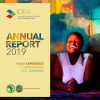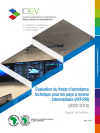Promoting inclusive growth is one of the two overarching objectives of the Ten-Year Strategy (2013-2022) of the African Development Bank (“AfDB” or “the Bank”). While there has been substantial progress over the past decade, limited access to finance continues to be a key constraint for households and firms in Africa, particularly for small and medium enterprises (SMEs). The environment in which African financial systems operate has also changed significantly in recent years, as recalled in the Bank’s 2014-2019 Financial Sector Development Policy and Strategy (FSDPS).
| Evaluation Brief | File size |
|---|---|
| Access to Finance Thematic Evaluation - Highlight.pdf | 290.9 KB |

For IDEV, 2019 was a year of helping the AfDB and its Regional Member Countries to transform experience into knowledge and learning through independent evaluations, and supporting them to achieve their development goals through the lens of the AfDB’s High 5 Priorities, the 2030 Agenda for Sustainable Development, and the African Union Agenda 2063.
IDEV delivered 13 evaluation products, conducting and facilitating evaluations, knowledge sharing events, and capacity development activities in more than 26 countries in Africa.
| Evaluation Brief | File size |
|---|---|
| AR2019-Highlights_En.pdf | 275.83 KB |
Independent Development Evaluation (IDEV) at the African Development Bank (AfDB) has conducted an evaluation of the Bank’s Country Strategy and Program (CSP) in Eswatini for 2009-2018. The evaluation covered a Bank portfolio of 14 projects representing a total of UA 119 million in seven sectors: (i) agriculture; (ii) water supply and sanitation; (iii) transport; (iv) finance; (v) power/energy; (vi) environment; and (vii) multi-sector (governance).
| Evaluation Brief | File size |
|---|---|
| Eswatini CSPE Highlight EN.pdf | 726.64 KB |

The African Development Bank (AfDB) Regional Member Countries are categorized as low, middle, and high-income based on their per capita Gross National Income. Despite their relatively high per capita income level, most middle-income countries (MICs) in Africa remain vulnerable to external shocks from the global commodity and financial markets. Furthermore, they face unique development challenges such as rising income inequality and pockets of poverty, high youth unemployment and persistent infrastructure deficits.
| Evaluation Brief | File size |
|---|---|
| MIC-TAF-Highlight ENG.pdf | 415 KB |